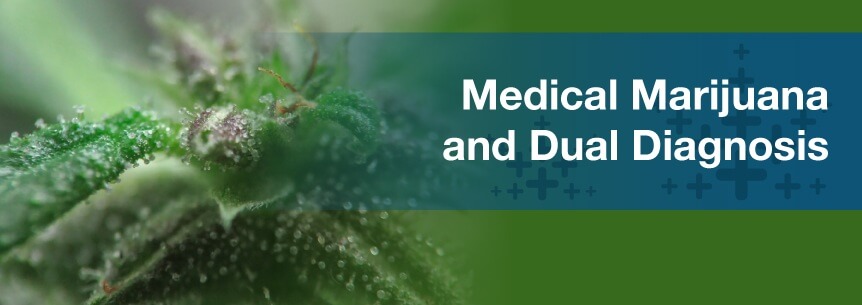
Medical marijuana is commonly used to ease symptoms of debilitating conditions like cancer or chronic pain. However, many people wonder if marijuana can alleviate the symptoms of mental health issues and substance abuse disorder. Because marijuana is still classified as a Schedule I drug — meaning it has a high potential for abuse according to the U.S Drug Enforcement Administration (DEA) — some medical professionals are hesitant to recommend marijuana for addiction treatment.
On the other hand, researchers argue that marijuana is less addictive than more dangerous substances like heroin and alcohol, and may even help patients overcome a dual diagnosis. According to the National Survey on Drug Use and Health (NSDUH), approximately 20.1 million Americans had a substance abuse disorder (SUD) in 2016. With that many Americans suffering from SUD, medical cannabis is a treatment worth considering.
A dual diagnosis is not easy to cope with, especially when traditional medical treatments do not seem to work. In this post, we’ll explore the possibilities of medical marijuana for dual diagnosis treatment to help you determine if it’s right for you or a loved one.
A dual diagnosis describes the presence of both a mental health issue and substance abuse disorder. An estimated 8.2 million American adults had a co-occuring mental illness and SUD in 2016. Half of those with a dual diagnosis did not receive any treatment.
People with a mental health issue such as depression, anxiety or post-traumatic stress disorder (PTSD) often turn to drugs or alcohol to self-medicate. They may use drugs to relax or escape painful emotions. Many times, the substance exacerbates the symptoms of a mental health issue once it wears off. This often leads to a vicious cycle of drug abuse, which, for many, is hard to stop. Because substance abuse and mental illness go hand in hand, modern treatment centers focus on treating both disorders.
Sometimes, it can be difficult to tell if a dual diagnosis exists because some drugs produce symptoms of mental health disorders. For example, alcohol is a depressant. Drinking too much alcohol naturally leads to a low mood once it starts to leave the body. However, a lot of people turn to alcohol when they first feel depressed. For example, women with a history of depression are twice as likely to drink heavily.
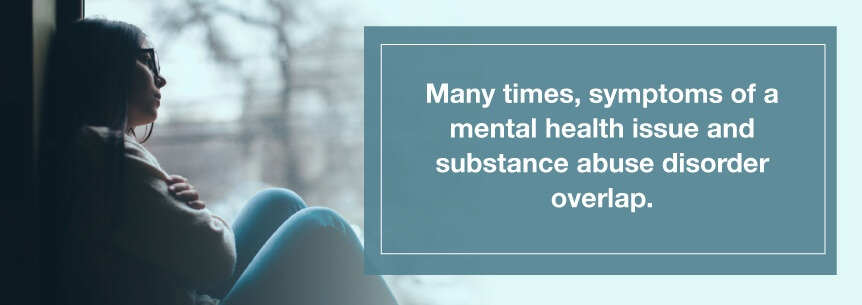
Symptoms of a dual diagnosis can be hard to diagnosis because they vary significantly between individuals. Many times, symptoms of a mental health issue and SUD overlap. Here are some signs of SUD:
Symptoms of a mental health condition might include:
Common mental health conditions associated with substance abuse include:
A mental health issue might lead to drug abuse. Other times, drug abuse happens first and leads to emotional problems down the road. Either way, effective treatment aims to treat both conditions simultaneously, often through the use of medicine, therapy and support groups.
Medical marijuana is currently legal in 29 states and is used to treat a wide variety of conditions, including:
The cannabinoids, or active chemicals in medical marijuana, help patients by:
Medical marijuana usually comes in the form of:
Cannabidiol (CBD) oil is extracted from the resin glands of marijuana buds and flowers. CBD is becoming increasingly popular because it does not produce the “high” related to marijuana consumption. CBD interacts with the brain 100 times less than tetrahydrocannabinol, or THC, the psychoactive chemical in marijuana.
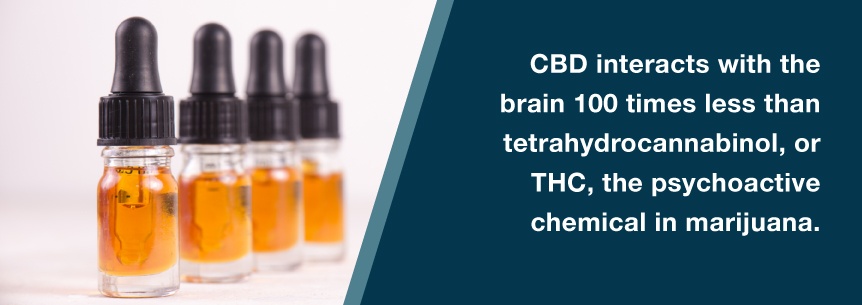
All human beings have an endocannabinoid system (ECS), which receives signals from cannabinoids and translates them to produce different effects. In fact, our bodies create some cannabinoids — called endocannabinoids — on their own, which help regulate functions like sleep and pain.
THC affects the brain’s endocannabinoid receptors by producing a “high” sensation, whereas CBD encourages the body to use its natural endocannabinoids more effectively and is not psychoactive. The effects of CBD may help relieve the symptoms of different conditions, including inflammation and pain.
Current research indicates CBD could help patients with a variety of disorders. For example, a study published in the Journal of Experimental Medicine illustrates how CBD suppressed pain and reduced inflammation in mice and rats. This study suggests people can benefit from the pain-relieving qualities of CBD oil, rather than relying on over-the-counter medications to relieve pain.
Addiction affects the lives of many Americans. Opioid dependence, for example, has become an epidemic in the United States. Unfortunately, it is not uncommon for an injury or chronic pain to lead to an addiction to prescription pain medication. Patients may be prescribed an opioid, like OxyContin or Percocet, to ease their pain. Both of these medications do not only relieve symptoms, but they also create feelings of euphoria. Some people — particularly those who also suffer from mental health issues — may be vulnerable to a painkiller addiction.
The opioid crisis has affected every community in America, no matter how big or small. According to the 2016 NSDUH, 11.5 million Americans misused prescription pain medications, and almost one million used heroin. Opioid addictions are not only widespread, but they are also potentially fatal. In 2015 alone, there were 12,990 heroin-related overdose deaths and 20,101 deaths related to prescription painkiller overdoses.
What’s the solution? Instead of managing pain or anxiety with addictive opioid medications, patients and physicians are turning to medical marijuana — there are no marijuana-overdose deaths on record.
Marijuana is not only being used to replace addictive medication for pain management, but it is also helping patients overcome addiction. Some states use marijuana clinics to help patients recover from opioid dependence. In Massachusetts, for example, Dr. Gary Witman, operator of the Canna Care clinic, claims 75 percent of his patients were able to stop using drugs like heroin with the help of marijuana. How? First, consider the following symptoms of heroin withdrawal:
Now, consider that medical marijuana is used to treat:
As you can see, cannabis helps relieve many of the symptoms associated with heroin withdrawal. NSDUH survey respondents from 2008 to 2013 with a history of illicit opioid use experienced a 55 percent reduced risk of opioid use when they used marijuana.
Although medical marijuana is a relatively new area for doctors and scientists to explore, it’s reasonable to say it is a safer alternative to pain medication than prescription opioids — one that may even help sufferers of chronic pain overcome addiction to prescription drugs.
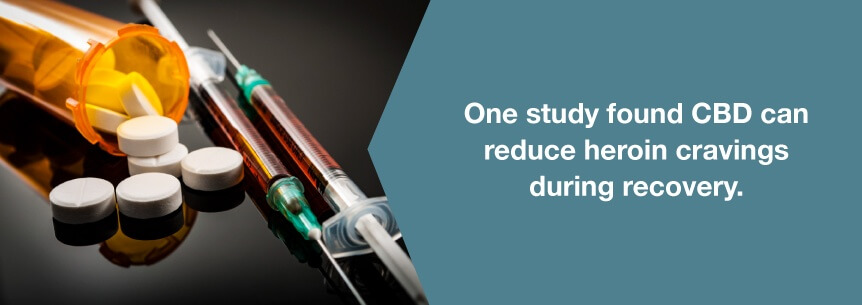
CBD is also a potentially useful form of addiction treatment. One study found CBD can reduce heroin cravings during recovery. In this study, individuals addicted to opioids did not use the drug for seven days and were given either a placebo or CBD for three consecutive days. The study participants were shown cues to induce a desire for heroin. Those given the CBD experienced reduced cravings after a single dose of CBD, and they also experienced less anxiety and no adverse effects.
The side effects of CBD seem minimal compared to other medications or drug withdrawal symptoms. Many people can handle CBD well without any side effects, but a few may include:
Another benefit of CBD is that you do not need to take it daily for it to be effective. In a study where rats were given CBD for seven days, researchers discovered CBD reduced anxiety and impulsive behavior even months after administration.
Much is yet to be discovered, though recent research is showing medical marijuana and CBD may help relieve the symptoms of mental health disorders.
Mental health issues are more common than one might think. According to the 2018 State of Mental Health in America report, more than 40 million Americans — or one in five — have a mental health condition. Nearly half of them have a co-occuring substance abuse disorder, as well.
Many kinds of mental health conditions exist, but the most common types of mental health disorders include:
Can cannabis effectively soothe mental illness symptoms? Some studies say yes. For example, one review of the antipsychotic effects of cannabidiol concluded that CBD has antipsychotic effects with an extraordinary safety profile, suggesting it may be a worthwhile treatment option for schizophrenia or other psychotic disorders.
According to a study published in 2015, findings suggest CBD effectively treats:
CBD regulates fear and anxiety without causing harmful side effects, so researchers recommend using CBD as a treatment for anxiety disorder in oral doses. When paired with cognitive behavioral therapy, CBD enhances overall treatment.
Substantial evidence suggests the effectiveness of CBD in treating specific mental health disorders, but what about medical marijuana? The country still has mixed opinions regarding medical marijuana’s ability to help mental health conditions, but scientists are confident in its effectiveness. Medical cannabis may not be right for everyone, and a lot of research still needs to be conducted. Regardless of your beliefs, it is always best to consult with a doctor first to find out if medical marijuana is the best treatment for a mental health issue.
One study of adults with bipolar disorder found no negative correlation between marijuana use and their disorder. In fact, they found that marijuana significantly improved their mood and alleviated several symptoms of bipolar disorder.
Another study published in the Hawaii Journal of Medicine and Public Health found that half of the patients who used cannabis experienced not only a decrease in physical pain but also relief from stress and anxiety, while 45 percent experienced relief from insomnia. Seventy-one percent did not suffer from any adverse side effects.
With all the world of science and medicine has proven about medical cannabis in the past five to 10 years, more and more patients want to use it to treat debilitating mental health conditions. Luckily, many different strains of cannabis exist, so scientists are continually discovering additional healing qualities of marijuana.
A lot of people use drugs like heroin and other opioids to soothe anxiety and stress — according to findings from the Reed Hruby Heroin Prevention Project, more than 75 percent of interviewees reported having mental health issues. Most claimed they used heroin as a form of self-medication to ease symptoms of mental health disorders.
Because medical cannabis products can potentially relieve symptoms of mental health conditions and drug addiction, it makes sense to assume that medical marijuana could be an effective dual diagnosis treatment. Cannabis does not put patients at risk of an overdose, unlike other medications. Also, marijuana medicine is less likely to cause harmful side effects than prescription pharmaceuticals.
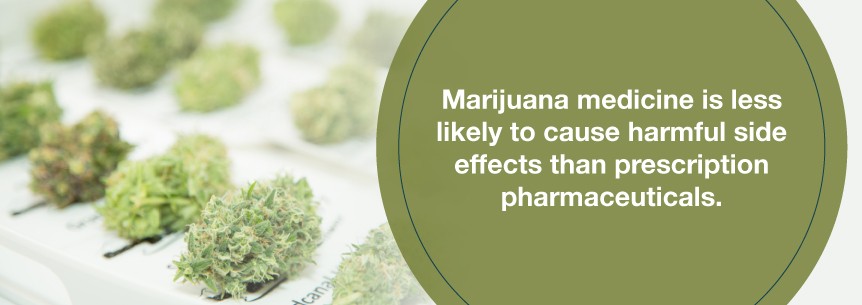
For example, methadone — which is commonly used to help patients overcome heroin withdrawal — has serious side effects and the potential for overdose. A few possible side effects of methadone include:
Similarly, prescription antidepressants commonly cause side effects such as:
Other medications used to treat anxiety, like habit-forming benzodiazepines such as Xanax or Klonopin, could potentially lead to prescription medicine abuse. CBD, on the other hand, can be used to treat anxiety and SUD without the side effects of traditional medications. The most common side effect of CBD is tiredness.
In conclusion, based on the evidence, using medical marijuana or CBD for dual diagnosis treatment seems to be potentially useful forms of treatment. As discussed, many who suffer from substance abuse disorder turn to drugs to relieve the symptoms of anxiety, depression, PTSD and other mental health issues. Cannabis products may help patients feel less anxious, experience improved moods and depend less on pain medication. Overall, marijuana and dual diagnosis treatment deserve more in-depth research so doctors can provide better patient care.
If you or a loved one would like to learn more about medical marijuana and dual diagnosis treatment, reach out to us today to connect with a cannabis-certified doctor. To learn more about medical marijuana laws in your state, let us be your go-to guide. Requirements vary in each state regarding both medical marijuana and CBD, so it’s important to know where your state stands.
Our site is designed to connect patients with qualified cannabis-friendly doctors. Patients can use our network to locate a marijuana-certified doctor or dispensary near them. We make appointment requests fast and straightforward, all of which you can complete online.
Although marijuana has been used to treat medical conditions for hundreds of years, it has only recently become acceptable in the medical field. We strive to help you navigate this new territory to find physicians and information you can trust. Physicians also benefit from our site by gaining greater exposure and enjoying secure appointment requests. To better serve our audience, we make it a priority to educate both doctors and patients about the latest medical marijuana news and research.
If you need treatment that works for a dual diagnosis, there is hope. Take control of your health and happiness with treatment that works for you. Register today to find a doctor near you or sign up for our free monthly newsletter. Don’t wait to get help — start enjoying the health benefits of medical cannabis and CBD oil today!
Find A Doctor Find A Dispensary